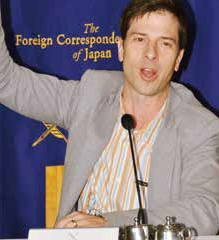Issue:
After almost two decades as a popular entertainment personality, Patrick Harlan is both cheerleader and critic of the Japanese media.
JAPAN NEEDS TO MOVE away from news programs that shy away from controversy in favor of harmony, believes Patrick Harlan, the U.S.-born television personality, and embrace a model such as that pioneered by Jon Stewart in the hugely popular Daily Show on American screens.
“News, from an American perspective, is very different from news from the Japanese perspective,” said Harlan, who is one half of the PakkunMakkun comic duo but is also in demand as a commentator on television chat shows and recently started to host the TV show “Through Foreign Journalists’ Eyes.”
“My impression is that Americans thrive on controversy and you only have to look at the leading Republican candidate for the presidency; he’s a walking controversy, and that’s why he is so popular.” When Donald Trump holds forth, ratings go up, advertising dollars flood in and the station is happy, Harlan said.
Speaking at a recent press event at the FCCJ, he said he believes that this country needs more stimulating debate of the news, more options on news coverage and more interpretation of the news. But he admitted the different mindset makes those possibilities less likely. “I’m not sure that it would thrive in the same way as it does in America because when a Japanese television program does present a controversial issue, they try to present it with limited controversy,” he said. “They don’t want to get telephone calls from aggravated viewers. But I think it might be time for a new media model to be given a chance, to stoke a little controversy and to take those calls from angry viewers.”
Harlan says he hopes his BS-TBS show might evolve into that sort of program and he intends to model himself on Jon Stewart. And for good reason.
“There was a study in the U.S. in which they asked people on the street about their knowledge of domestic and international events and ranked them based on where they got their news from,” Harlan said. “The highest ranked were people who listen to National Public Radio, the second most informed group were people who watched Jon Stewart’s politico comedy real news with funny jokes that lingered and gave people a good understanding of the news.

“Third was CNN, then the people who watched no news at all were the fourth most-informed group and the fifth most informed group got their news from Fox,” he added with a shrug.
I think you can have a strong press corps that is polite without being namby-pamby and weak.
Entertainment is not a career that Harlan planned for himself. A graduate of Harvard University, where he studied comparative religion, he came to Japan in 1996 with the intention of staying a year.
Almost two decades later, he is one of the longest-serving foreign talento on the Japanese entertainment scene doing everything from DJing to acting, stand-up comedy and appearing on radio and TV as a commentator. He also finds time to teach at the Tokyo University of Technology.
Japan’s quirky approach to comedy was a difficult skill to master initially, Harlan admits, with politics and sex jokes effectively off-limits and “red-neck” jokes passing Japanese audiences by. He has also had to get to grips with the all-powerful agents who manage personalities here, as well as the convention of unscripted “variety” shows on television.
While praising many aspects of the Japanese media world, he is frank about his concerns. “Japanese people do not grow up debating, so you see very little hardcore discussion of the news on television,” he said. “Instead, you see people being nice to each other, which is a trademark of Japanese society. But the exchange of ideas is not helped by that politeness.
“I think you can still have strong debate with politeness and I think you can have a strong press corps that is also still polite without being namby pamby and weak.” He went on to point out some “frightful developments regarding freedom of the press recently,” including the example of a prefectural governor who refused to be interviewed by a newspaper because he objected to an article in a magazine affiliated with the newspaper.
“And recently, a television company was taken to task by the government for the content of one of its broadcasts,” he said. “In America, the government interfering with the story would be the story. The government interfering with the freedom of the media would automatically set off an incredible response from all media outlets, not just the targeted one.”
In recent years, Harlan suggested, there has been a sharp decline in respect for the freedom of the press and the media in general. “I see this as a trend from humor through communication and into the media,” he said. “I feel the ‘kisha-club’ system needs to be revised because it is a hurdle to the freedom of the press.”
He admitted that American news coverage is just as imperfect as the news that is served up here “It’s over the top and alarmist” but suggested that there are opportunities for the two countries to learn from each other’s systems.
“That is where foreign correspondents have a role to play,” he said. “Bringing foreign perspectives into Japan and exporting Japanese perspectives to the world. Now, more than ever, we need you.”
Julian Ryall is the Japan correspondent for the Daily Telegraph.

